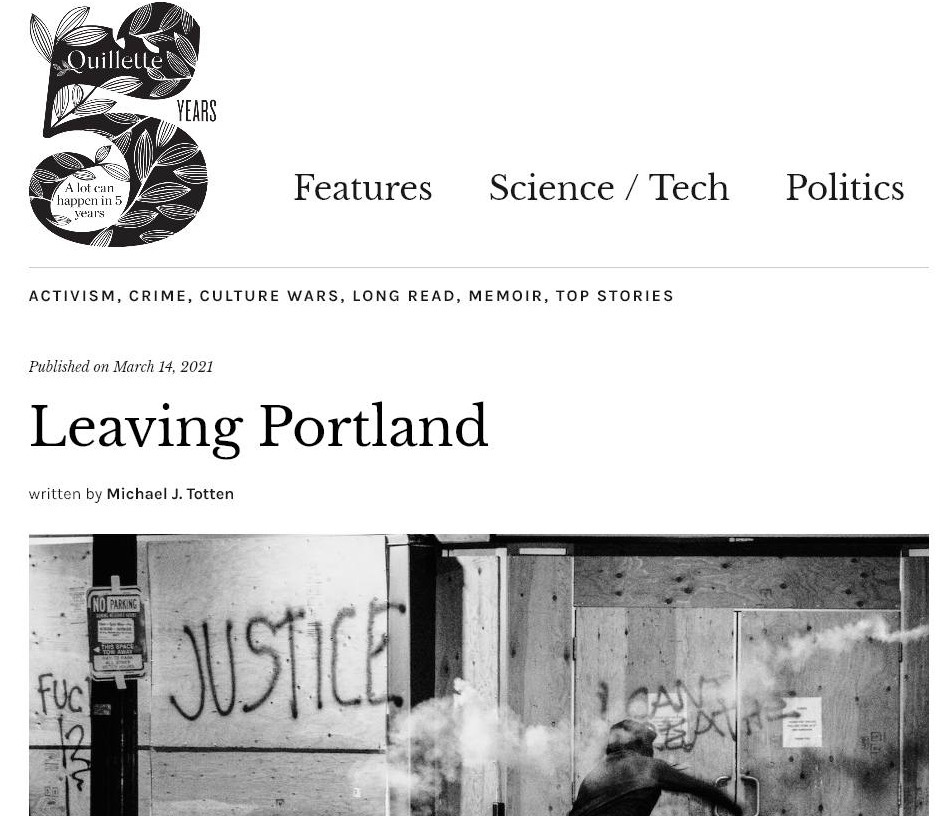
Michael Totten is a veteran writer who recently gave up on living in Portland and moved out. His story, called “Leaving Portland,” is worth reading for its Northwest history, the transformed and Europeanized Portland he once loved, and what happened to turn the Rose City into a place of “chronic anarchism.” He holds out some hope that Portland will sober up. Leaving the place proved hard, since real estate near the core of Portland has become very hard to sell.
Interestingly, Totten lays much of the blame for Portland’s problems on Mayor Ted Wheeler who, Hamlet-like, kept trying to find a feeble centrist stance as the city faced night after night of violence. Stop the violence, respect the right of protesters, and move aggressively to reform police. Impossible? The hugely unpopular mayor managed to win reelection, running against an opponent who boasted “I am antifa.” The radical extremists for city council also did poorly. In contrast, a previous mayor, Vera Katz, managed in earlier years through smart urban planning to dramatically make over a once-grim and depressing town.
Here’s a sampler of Totten’s broad historical analysis:
For the most part, the Pacific Northwest’s regional culture combines the best of Appalachia and New England while rejecting the worst. But a small minority of the population retrieved the rejected parts of the recipe from the cutting room floor and combined the worst instead of the best, melding Kentucky’s vigilantism and feuding with New England’s Puritanism and witch hunting.
The anarchists in Portland who throw things, smash things, and burn things are not protesting for progressive reforms. They insist that we abolish the police, abolish prisons, abolish borders and nation-states, and return the land to Native American sovereignty. They are demanding the impossible, and they are demanding it violently. New England’s utopian streak tends to attach itself to big, strong government. Appalachia has been radically anti-government for hundreds of years, but utopianism is alien to that part of America. Only in the Pacific Northwest are these contrary attitudes fused at scale.
I used to fear that Seattle was heading down the path of too-rich-and-too-poor San Francisco. Now there is a new dystopia to fear, improbably named Portland.
Discover more from Post Alley
Subscribe to get the latest posts sent to your email.

The Appalachian-New England folkways musings in the piece are its weakest and least convincing portion, imo. But many of his other observations of the change in Portland are interesting and insightful.
Again, another in a strange and continuing string of condescension towards Portland which contains strong sniffs of white superiority. This time, celebrating a writer who–as a Portland runaway–appears to opine about real estate values and interruptions to urban gentrification. The coding with ‘Europeanized’ is to stand in for civilized and good, while conflating Portland’s strong and elemental drive for equality and racial justice with a form of Kentucky vigilantism is coding for: Please, please see these frustrated protestors in Portland as U.S. Capitol white-supremacist terrorists.
The author shows a complete unwillingness to find any meaning at all in the nation’s most committed, meaningful and sustained protest against what we ALL know to be insidious racism and vast inequality–choosing over and over to point only at the small minority of those who would let strong emotions pour forth into property damage. There is nothing to fear, Mr. Brewster, than Fear itself.
Agreed! The protests that swept across the Land last year, so strong in our region, are rejections of racism of course, but were also rejections of gentrification and the American Empire in the Cascadian bioregion. I don’t think that people understand this is an essential character of the region, of the decline of the Empire. Bourgeoisie, especially the recent techno state-dependent class, will naturally fear the wresting back of power. No doubt it’s ugly, no doubt we have issues, but the rebellion, violent or not, of those who insist upon mutual aid, upon equality, upon care for each other, and for myself anyways, on bioregionalism, is justified and righteous.
What is bioregionalism?
The idea that arbitrarily drawn nation states are colonial artifacts. Bioregionalists hope that organized regions to which power is attached will be, as they once were, determined by natural boundaries. To be more specific, I’m referring to Cascadia, a region that includes what are now called BC, Washington, Oregon, Idaho, and California. Its borders are the watershed of the Columbia and some other rivers going north. What I and I think a lot of people like about bioregions is that they are definitionally connected to the ecosystem in which they exist, and in writing the constitution of a new state based on the bioregion, the balance of people within the ecosystem is considered with high priority. Why be part of a nation-state that simply practices extraction from the Land and people of our region without giving back? The feds, the corporations, the East Coasters don’t live here, they don’t care…and I don’t believe they ever can.
That’s a very high-level and limited explanation of the concept but hopefully it helps!
https://cascadiaunderground.org/
I think the comments are funnier (unintentionally, by the writers) than the story, and no disrespect to Mr. Brewster.
How so?